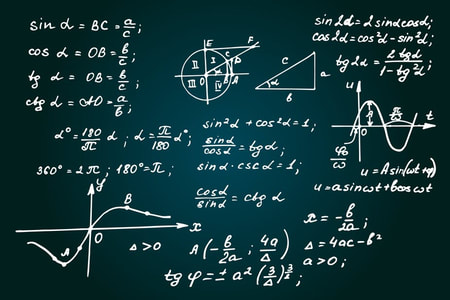While physics and mathematics may tell us how the universe began, they are not much use in predicting human behavior because there are far too many equations to solve. I'm no better than anyone else at understanding what makes people tick, particularly women.
Stephen Hawking
|
|
Introduction

Some students may feel that mathematics and Theory of Knowledge do not have much in common. In fact, the opposite is true. The mere fact that mathematicians use their own 'language of symbols' raises interesting TOK questions about the role of language within the methodology of an area of knowledge or discipline.
Mathematical 'truth' is considered irrefutable to some, but why is this the case? It is quite remarkable how we can seemingly claim something with such a high degree of certainty within mathematics. Mathematics seems to embody principles and assumptions which are universally valid. This is quite unique compared with other areas of knowledge. Perhaps this is due to the fact that mathematics is heavily based on reason. By creating its own language of symbols, mathematics also aims to reduce cultural or contextual influences in the creation of knowledge. In that sense, it may comes as no surprise that mathematicians across the globe readily agree about the validity of things such as geometry. However, to say that mathematics is completely removed from human experience would perhaps be too hasty. In fact, interestingly, mathematics has been used to prove what some people feel intuitively. Genuine new knowledge in mathematics is often the product of imagination rather than merely following the rules of reason. Things that are very much part of our human experience and intuition, such as concepts like beauty, can sometimes be explained through mathematics. The infamous 'golden ratio' calculation, for example, can be found in nature. This calculation also illustrates how facial symmetry and harmony in things like architecture are linked to the concept of beauty. Links between mathematics and other areas of knowledge such as the arts (where beauty and aesthetics play a role) can lead to interesting knowledge questions. Sometimes, we use mathematics to offer "proof" and produce knowledge in other areas of knowledge. The applications of mathematical knowledge are not confined to its own discipline. In fact, we like to use mathematics to add value to knowledge in other areas of knowledge such as the natural sciences. We also like to use mathematical calculations or mathematical language to explain behaviour in the human sciences. This utility of mathematics seemingly enhances the credibility of the knowledge it produces. However, we could wonder how useful it actually is to explain, let's say, human behaviour in mathematical terms. Are there circumstances in which applying mathematical knowledge to other areas of knowledge is not useful? The notion of the applicability of mathematics in the world around us leads to one of the most fundamental philosophical questions about the nature of mathematics.
Mathematical 'truth' is considered irrefutable to some, but why is this the case? It is quite remarkable how we can seemingly claim something with such a high degree of certainty within mathematics. Mathematics seems to embody principles and assumptions which are universally valid. This is quite unique compared with other areas of knowledge. Perhaps this is due to the fact that mathematics is heavily based on reason. By creating its own language of symbols, mathematics also aims to reduce cultural or contextual influences in the creation of knowledge. In that sense, it may comes as no surprise that mathematicians across the globe readily agree about the validity of things such as geometry. However, to say that mathematics is completely removed from human experience would perhaps be too hasty. In fact, interestingly, mathematics has been used to prove what some people feel intuitively. Genuine new knowledge in mathematics is often the product of imagination rather than merely following the rules of reason. Things that are very much part of our human experience and intuition, such as concepts like beauty, can sometimes be explained through mathematics. The infamous 'golden ratio' calculation, for example, can be found in nature. This calculation also illustrates how facial symmetry and harmony in things like architecture are linked to the concept of beauty. Links between mathematics and other areas of knowledge such as the arts (where beauty and aesthetics play a role) can lead to interesting knowledge questions. Sometimes, we use mathematics to offer "proof" and produce knowledge in other areas of knowledge. The applications of mathematical knowledge are not confined to its own discipline. In fact, we like to use mathematics to add value to knowledge in other areas of knowledge such as the natural sciences. We also like to use mathematical calculations or mathematical language to explain behaviour in the human sciences. This utility of mathematics seemingly enhances the credibility of the knowledge it produces. However, we could wonder how useful it actually is to explain, let's say, human behaviour in mathematical terms. Are there circumstances in which applying mathematical knowledge to other areas of knowledge is not useful? The notion of the applicability of mathematics in the world around us leads to one of the most fundamental philosophical questions about the nature of mathematics.
Mathematics is the most beautiful and most powerful creation of the human spirit. |
Mathematics is a place where you can do things which you can't do in the real world. |
Mathematics and the world around us
First of all, we ought to observe, that mathematical propositions, properly so called, are always judgements a priori, and not empirical, because they carry along with them necessity, which can never be deduced from experience. If people should object to this, I am quite willing to confine my statements to pure mathematics, the very concept of which implies that it does not contain empirical, but only pure knowledge a priori.
Immanuel Kant
Philosophers have debated for centuries whether mathematics is discovered or invented. Formalists believe that mathematics has more similarities with a kind of game, which does not need to be reflected by the outer world. Platonists, however, believe that mathematical concepts exist independent of human understanding. The relationship between maths and the world around us is an important one. Other areas of knowledge, such as the natural sciences, are very much dependent on what they observe in the natural world. When we study mathematics, it is as if we enter into its own world, which is removed from what we can or should observe. Although the initial principles of mathematics may be based on what is present around us, we build much mathematical knowledge by following mathematical rules that are independent of the natural world. It is true that most mathematical knowledge will find real-life applications eventually. Yet, mathematics has its own methodology, which is very different from, let's say, the scientific method. Mathematics is often very abstract and far removed from every day life. In this sense, it is perhaps no surprise that many ancient mathematicians were also philosophers. these philosophers were very much concerned with the complex relationship between what we can(not) observe around us and what actually is "out there".
|
|
Was Maths discovered or Invented?
As far as the laws of mathematics refer to reality, they are not certain, and as far as they are certain, they do not refer to reality. |
Without mathematics, there's nothing you can do. Everything around you is mathematics. Everything around you is numbers. |
|
|
|
|
Without mathematics, there is no art. |
Truth is ever to be found in simplicity, and not in the multiplicity and confusion of things. |
I have found a very great number of exceedingly beautiful theorems. |
|
|
|
|
Knowledge in Mathematics
Your browser does not support viewing this document. Click here to download the document.
| __________mathematicstok__2_.pptx | |
| File Size: | 4584 kb |
| File Type: | pptx |
|
|
|
|
Things still "unknown" in Maths: Riemann Hypothesis
|
|
Sometimes it is the people who no one imagines anything of who do the things that no one can imagine. |
As you will find in multivariable calculus, there is often a number of solutions for any given problem. |
The essence of mathematics lies in its freedom. |
|
|
Maths and Philosophy
An explanation of the Mathematics and Philosophy course at Oxford University
Adventures in thought.
Do numbers exist? The 3 Schools of mathematical Philosophy – Platonism, Nominalism, Fictionalism:
Lesson idea: What's the use of Maths?
On using maths in other AOKs
ACTIVITY: Divide the class in 4 groups, and allocate each group an AOK: History/The Natural Sciences/The Human Sciences/The Arts.
Each group has to "use" Maths to propose a theory and/or prove something in their AOK.
Students then compete for the best argumentation: "Maths is very important for my AOK because...."
(This will be more obvious for some AOKs than others, so the "most original or insightful" argumentation will win).
Follow-up discussion:
Do mathematical symbols have meaning in the same way that words have meaning?
Does mathematics only yield knowledge about the real world when it is combined with other areas of knowledge?
Why is mathematics so important in other areas of knowledge, particularly the natural sciences?
If mathematics is created by (wo)man, why do we sometimes feel that mathematical truths are objective facts about the world rather than something constructed by human beings?
Each group has to "use" Maths to propose a theory and/or prove something in their AOK.
Students then compete for the best argumentation: "Maths is very important for my AOK because...."
(This will be more obvious for some AOKs than others, so the "most original or insightful" argumentation will win).
Follow-up discussion:
Do mathematical symbols have meaning in the same way that words have meaning?
Does mathematics only yield knowledge about the real world when it is combined with other areas of knowledge?
Why is mathematics so important in other areas of knowledge, particularly the natural sciences?
If mathematics is created by (wo)man, why do we sometimes feel that mathematical truths are objective facts about the world rather than something constructed by human beings?
Making connections to the core theme, a suggested by the TOK Guide
- Is it possible to know about things that we cannot experience?
- Is personal experience more important or less important in mathematics compared to other areas of knowledge?
- Why does mathematics enjoy a privileged status in many education systems?
Possible knowledge questions on mathematics
Acknowledgements: The knowledge questions are taken from the TOK Guide (2022 specification)
|
Scope
|
Perspectives
|
|
Methods and Tools:
|
Ethics
|






















